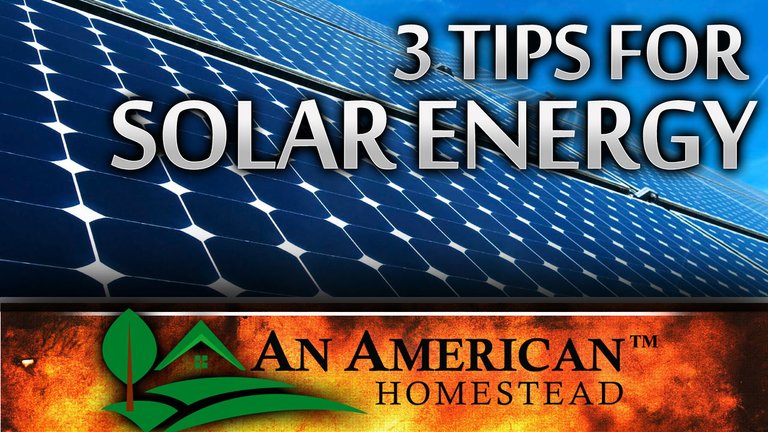
VIMEO AVAILABLE ( In case Dtube doesn't load)
Electricity costs are only going up in today's world. We are constantly hearing about alternative energy solutions and how much they benefit but make no mistake, there is a deep learning curve to this technology. You will greatly benefit by learning all you can about solar before you actually dive in. Even better would be to tutor yourself under someone who already has the experience at building solar and alternative energy systems.
In this video, I give you 3 tips when thinking about building a solar and alternative energy system that will be your own grid.
Any system you build is going to be expensive. There is no cheap solar.
1.Harbor Freight?
2.Components
3.Wiring
4.Accessories - digital readouts, remote temp gauges, extra grounding gear and lightning arrestors, additional fuses and shut off devices (not even mentioning wind turbines and hydro setups.)Most setups all connect the same way, (childrens song)
Use the largest multi-strand wire you can afford or that your devices will accept. Warm or hot wires are bad news.
Stay tuned for other videos coming out in the Making Your Own Grid series. We want you to be successful and profitable when making your own energy.
ENJOY THE VIDEO!

Visit Us Online: http://AnAmericanHomestead.com


 EVERYTHING IN THIS POST POWERED BY SOLAR
EVERYTHING IN THIS POST POWERED BY SOLAR 
► Watch on DTube
► Watch Source (IPFS)
Where we live, the government has sold off the distribution of all power produced in the country to a private Spanish company. That means anything we produce we have to run through a meter and pay the electric company for the privilege of producing the power for your own use! We ran into this when we had 18-hour rolling blackouts every day. My husband was teaching mathematics classes online and needless to say it became impossible, so we bought a generator for those hours he needed to teach. The local electric company showed up demanding that we put the power through the meter or we would be accused of stealing power. This necessitated us going to court to get a permission to use your own power. I believe this will be the case once again when we install solar/wind power on the homestead.
Apparently a lot of people think that you have to hook your solar system up to your electric box in order to use it. If you're willing to run the proper wires in your house, you can use 12 volts for lighting and other things that you normally use the grid for. You will need batteries for that, but solar isn't cheap to start with. You can also get a power inverter for your 120 volt needs, but not connected to the grid.
Exactly right.
the problem with us here, if we add solar to our home(stead) the local utility company comes in and makes it a hassle. We need to be further out, more rural. My husband is on the bandwagon for solar, and there are so many videos with how to set up from the panels' angles to the battery banks that I know we could do it. Just need to move the homestead away further.
Keep searching and I know you will find your perfect place! Blessings!
You don't have to connect your solar system to the grid or your regular power in your house. You can use your solar with separate 12 volt wiring for lights and other low draw things.
Great post for the solar newbie. I resteemed it on my page. I have a very small stand-alone system and it cost about 6K for 5 panels. The last black-out that we had proved that it will power a PC, a light, the radio and the Keuring.
It was so funny because our neighbours were trying to figure out why we had power meanwhile my hubby was outside drinking a hot cup of coffee watching the stars.
Now we're thinking a lot about how to get electricity in a smart way.
But does anyone think how to get a replacement for electricity?
Check out my comment that I just made to this post last night:
https://steemit.com/homesteading/@livingtraditions/off-grid-vs-on-grid-should-we-be-going-off-grid#@bobbleheadstead/re-anarchrysalis-re-bobbleheadstead-re-anarchrysalis-re-livingtraditions-off-grid-vs-on-grid-should-we-be-going-off-grid-20170904t130646024z
I think it gets at what you are saying...
like what?
Shared for some more awesome tips from someone living it!
Another great video. I'm sure there are lots of folks who think off grid living is easy. It's not. Steem On Brother!
speaking of heavy duty wire.
Welding Cables are your friend.
I had some booster cables made from them on the truck
MUCH better than anything else I'd used.
I can imagine how well that would work. I've heard of people doing that with welding cables. Most of the cheap jumper cables that I've seen have had skinny wire that gets hot if you actually need to use them.
The electric company in my area has bought land and put in solar panels. It is not a small setup either, There is at lest 300 or more acres in just one of the solar fields and there are several of these fields all around the area.
You don't necessarily need to spend a ton of money getting the biggest cables that will fit into the connectors. The wire sizes that the terminals can accept may or may not match up with the current that the system is able to provide. Just make sure to check what you really need, and get the correct size wire for the job, taking into consideration future needs and possible expansion. Also be mindful that the current rating for a wire is not strictly a function of the wire itself, but also the temperature rating of the insulation on the wire. You can get wire rated for 125 degrees C or higher, which can carry a lot more current without the risk of a fire than the same wire size rated for 70 degrees C. Just because the wire is warm/hot doesn't necesssarily mean that there is a risk of a fire, but you will be running at lower efficiency and may suffer from increased voltage drop. Personally I'd run the largest wire I could because I wouldn't want to have to change it later. But if you have a specific purpose for the system, know you won't be expanding, or have already taken system expansion into consideration, you may be able to get by just fine with a smaller wire and save a few bucks.
thanks for the video, i need to get solar for our rv, as we are full time rver's and in the future looking to buy rural land